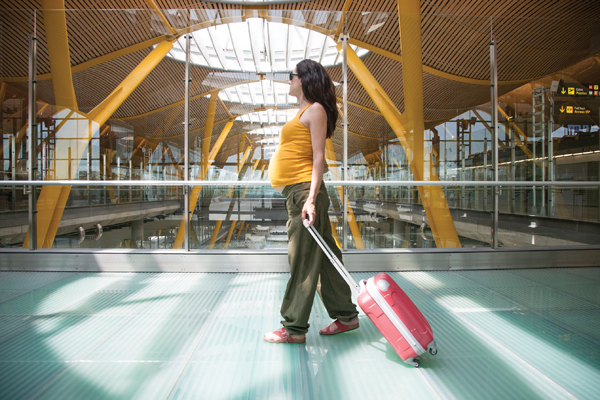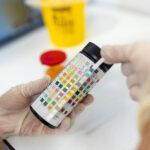Bump on board

Whether your job requires regular travel or your budget allows […]
Whether your job requires regular travel or your budget allows for recreational trips (hello, babymoon!), jet-setting while pregnant is often a part of the modern mom-to-be’s life. And happily, that’s A-OK.
“There’s really no medical reason why you can’t travel during pregnancy,” says Jennifer Bump, MD, OB/GYN and assistant professor of obstetrics and gynecology at Baylor College of Medicine in Houston. However, there are a few precautions you should take to ensure you and your budding babe remain safe both en route and at your destination.
Window of opportunity
The American College of Obstetrics and Gynecology (ACOG) suggests the best time to travel is between 14 and 28 weeks’ gestation because most emergency situations take place before or after that time. Plus, morning sickness will likely have subsided by the second trimester, and your energy levels should be high, as compared to earlier and later weeks.
As your due date nears, your bump can become unwieldy, and getting around might be more challenging and less comfortable. So book your trip right in the middle of your 40-week adventure if you can.
If an important work conference or good friend’s wedding is scheduled in the homestretch of your pregnancy, talk to your care provider to determine whether attending is advisable. Most commercial airlines allow passengers up to 36 weeks, but they may require a letter from your practitioner. It’s always wise to double-check.
No matter when you go, get a recommendation for a doctor at your destination in case you require medical care while you’re away. It doesn’t hurt to carry a copy of your medical chart with you as well. “Pregnant women who have symptoms that are concerning to them should contact their provider, regardless of where they are, to get advice on the best next steps,” says Chloe Zera, MD, maternal-fetal medicine specialist at Brigham & Women’s Hospital in Boston.
On the move
During a long road trip or even a cross-country flight, it’s not uncommon to remain seated for hours at a time. But sitting still for too long could be dangerous for a mom-to-be. “Pregnancy in general is a hypercoagulable state,” explains James Betoni, DO, co-author of The Pregnancy Power Workbook and OB/GYN in Boise, Idaho, which means expectant women are at an increased risk for blood clots.
“Get up and walk around once an hour or so,” advises Bump, who jokes you’ll probably have to pee as often anyway. “That should be sufficient to decrease any increased risk of blood clots you might have from sitting still.” Betoni adds that wearing compression stockings can help with circulation, too.
If you’re traveling by plane, book an aisle seat, so you have easy access for stretching your legs—and relieving your bladder—while up in the air. Make frequent pit stops on car trips to use the bathroom, do a few yoga poses or even take a short walk, recommends Zera. Your total time on the road should be limited to six hours per day.

When you’re lifting your suitcase into the overhead bin of an aircraft or making the lengthy trek to baggage claim, take care to pay attention to your body.
“Pregnant women don’t necessarily have any physical restrictions as long as their pregnancies are uncomplicated,” notes Bump. If the activity level is on par with what you did before you had a bun in the oven, it’s probably OK to do it while expecting, too. But, Bump adds, “If it’s difficult to hold a conversation, then you need to back off.”
Keep in mind that the hormone relaxin, which relaxes your pelvic joints in anticipation of labor, is nonspecific—in other words, it loosens all the other joints in your body as well.
“It can make it easier to turn your ankle or pull a muscle in your back,” warns Bump, who advises being extra cautious when wearing high heels and taking care to use good posture when lifting heavy things. Don’t be shy to ask for help, either, she says. Pregnancy is just the time to rely on a doting partner or friendly stranger to assist you.
In good health
Whether you’re on a plane with 300 other passengers or a cruise ship with 3,000, you’re sure to be exposed to undesirable germs. The best way to avoid getting sick? Betoni suggests rest, hydration, and vitamin C and zinc supplements to boost your immune system. Bump prescribes frequent and thorough hand-washing.
“Stay away from people who are obviously sick,” she says, “and get a flu shot. The flu is much more devastating for pregnant women than it is for nonpregnant women.” The Tdap vaccine is also recommended to protect against whooping cough during pregnancy, as well as provide extended protection to your baby after birth.
If you’ll be traveling somewhere tropical, know that sunscreen with SPF 30 and bug repellent are not only safe but also recommended. “The diseases that you can catch from mosquitoes are much more concerning than any chemical in the bug spray,” says Bump. If you’re concerned about DEET (which she says is OK as long as you’re not ingesting it or dousing yourself in it), opt for an all-natural option instead.
When traveling outside the country, “Women should talk to their obstetric provider about their specific destination to see if any vaccines or medications, such as antibiotics, are necessary,” advises Zera. “General precautions about food and water safety during international travel also apply to pregnant women, who should not eat raw or undercooked meat or fish.” Note: If you’re traveling to a region affected by the Zika virus, click here for the latest information from the Centers for Disease Control & Prevention.
A quick getaway while expecting—especially for pleasure—is a terrific way to relieve stress, which tends to go hand in hand with pregnancy. It can also be an ideal time to visit faraway family, whom you may not have a chance to see again for a while after baby arrives. Babymooners will benefit from the dedicated time together, too. “The birth of a child is an exciting and extremely fulfilling time for any couple … but it can also cause changes in the relationship,” says Bump. “Getting a chance to reconnect before you have the additional stress once the baby [arrives] is a fantastic idea.”
You heard it here first, mamas: Book a trip to the beach! Doctor’s orders.
By Lauren Brockman
Image: iStock.com







